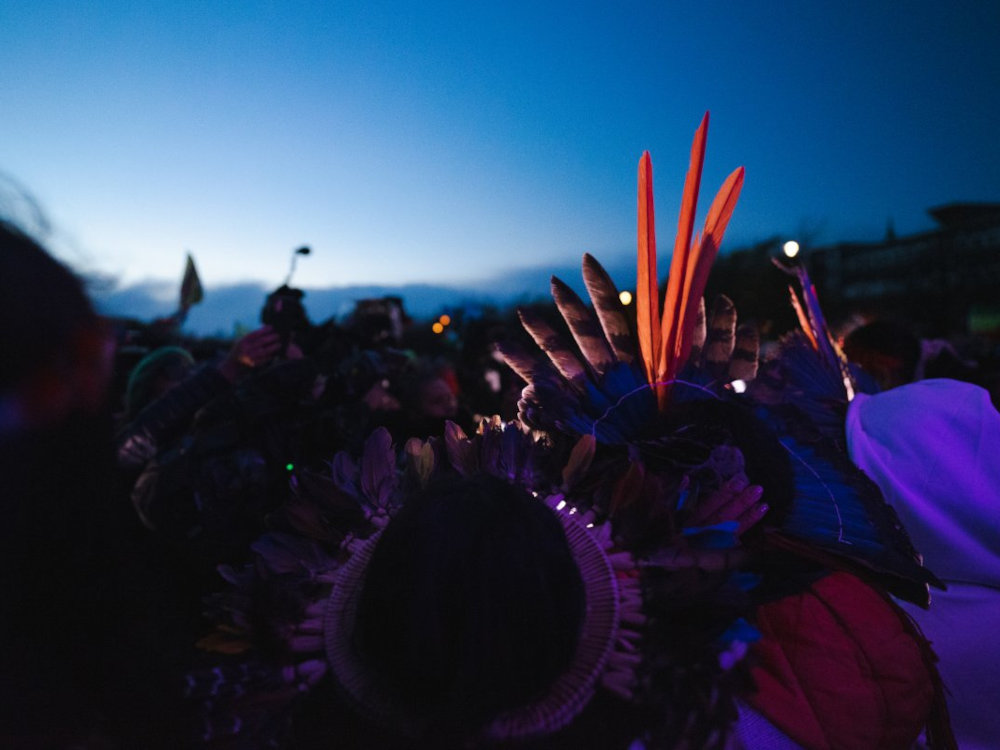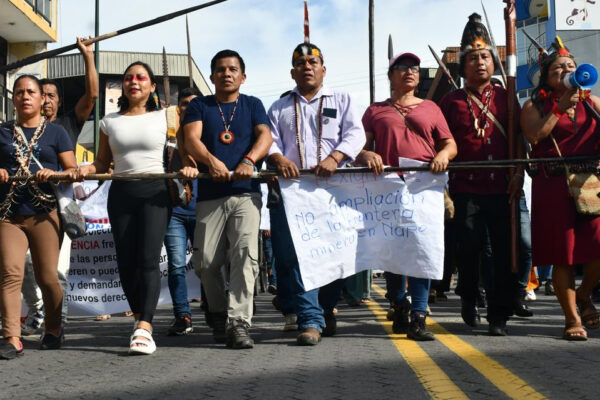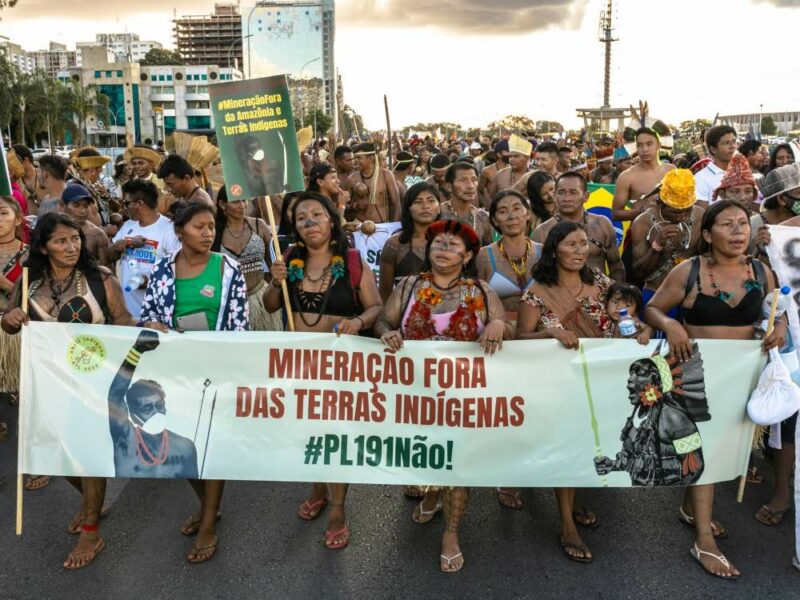Campaigning efforts have helped investors increasingly recognize that Indigenous peoples play a critical role in protecting and maintaining the world’s biodiverse ecosystems. Nevertheless, most investors and private-sector actors do not do nearly enough to respect Indigenous peoples’ rights. This creates risks not only for businesses but ultimately for the planet. When investors fail to understand and respect Indigenous peoples’ rights, they not only risk reputational damage but also ignore material business risks, which can cost companies and investors billions in cost overruns, delays, and project cancellations.
Until recently, many standards and guidance documents on social and environmental matters used by investors rarely addressed Indigenous rights in depth. To bridge this gap, Amazon Watch published a due diligence toolkit for investors focused on Indigenous rights.
Respect for Indigenous rights is crucial for protecting the Amazon and shields businesses from financial risks
Legal recognition of Indigenous territories is critical for preserving the Amazon, a fact that investors are increasingly recognizing. Storebrand’s Nature Policy, for example, acknowledges that “Securing Indigenous Peoples’ customary rights is widely recognized as the most effective way of protecting biodiversity and ensuring sustainable use of nature.” Conversely, failure to ensure respect for Indigenous Peoples’ rights may lead to systemic risks arising from nature loss and irreversible climate and biodiversity tipping points.
Indigenous peoples’ rights are protected by a growing network of international instruments, and jurisprudence, including FPIC, the right of Indigenous peoples to give or withhold their consent to activities affecting their lives, lands, territories, and resources. As such, the failure of businesses and investors to respect these rights leads to multiple risks.
For example, legal risks could include courts suspending permits or licenses granted to companies operating without Indigenous peoples’ consent. Operational risks may include protests leading to delays or even permanent obstruction of projects. This can translate into significant financial risk for investors, as well as reputational damage. A study of 330 oil, gas, and mining projects found that corporate “leaders” (those whose companies demonstrated greater respect for Indigenous rights) outperformed “laggards” by 4% in annual returns between 2010 and 2014.
Across the world, Indigenous peoples are disproportionately negatively impacted by corporate activities, including by the extractives, renewable energy, and agribusiness sectors, and increasingly by “nature-based solutions.” Despite the rights of Indigenous peoples being well-established in international law, these sectors still fall short.
For example, in the Amazon, over 31 million hectares of oil blocks overlap with Indigenous territories, and there is little if any evidence that the right of Indigenous peoples to give or withhold their Free, Prior, and Informed Consent was ever respected in any decision to develop such oil blocks.
In the mining sector, many companies have a policy to “seek to achieve” or “seek to obtain” Free, Prior, and Informed Consent of Indigenous peoples, in line with the International Council on Mining and Metals (ICMM) Position Statement on Indigenous Peoples. Such policies are deceiving, since they do not preclude proceeding with a project if Indigenous consent is withheld, thus allowing companies to violate or be complicit in violations.
The agribusiness sector not only drives encroachment and deforestation of Indigenous territories but also the poisoning of Indigenous communities with pesticides.
The renewable energy sectors are increasingly causing violations of Indigenous peoples’ rights, yet most renewable energy companies still lack adequate policies to address this.
In the carbon credits market, many projects have been found to violate Indigenous peoples’ rights. In the nascent biodiversity credit market, many initiatives have been found to ignore them, making them indistinguishable from carbon credits in this respect.
Latin America is also home to an approximated 185 distinct Indigenous Peoples in voluntary isolation, whose decision to remain isolated must be respected, according to international law. Their survival and continued existence are nonetheless threatened by extractive activities; just in Brazil, over 4000 mining requests have been made in regions home to 71 Indigenous peoples in voluntary isolation. If such permits are approved, it could potentially lead to the extinction of numerous Indigenous Peoples and the crime of genocide.
The global demand for minerals has also led to a surge of informal mining in the Amazon, often carried out by organized criminal groups, which has caused havoc across the region, contaminated waterways, and led to increased violence towards Indigenous peoples. There is strong evidence suggesting that those minerals end up in global value chains.
Some investors take action on Indigenous peoples’ rights
A small but growing number of investors have pioneered shareholder engagement on Indigenous peoples’ rights. In recent years, investor initiatives such as the Investor Policy Dialogue on Deforestation and the Nature Action 100+ have emerged and state that they address Indigenous rights.
Nonetheless, investors in general have thus far failed to develop and implement adequate policies on Indigenous peoples’ rights. A review by ShareAction found that only ten of the world’s 77 largest asset managers had a policy on Free, Prior, and Informed Consent of Indigenous peoples.
The way forward
International standards such as the U.N. Guiding Principles on Business and Human Rights dictate that all businesses and investors have a responsibility to respect human rights and prevent and mitigate adverse impacts by prioritizing the most severe impacts.
Adverse impacts for Indigenous peoples are often particularly severe, particularly in the Amazon. Those who seek to defend their rights are frequently subject to targeted criminalization by the government and are subject to intimidation, threats, and harassment, as well as disappearances and violence, including killings.
Additionally, failure to ensure respect for Indigenous peoples’ rights and the critical ecosystems within their territories will affect not just their rights, but those of the present and future generations of the entire planet.
Respecting Indigenous Rights: An Actionable Toolkit for Institutional Investors provides investors with a starting point to educate themselves and others about Indigenous rights, as well as practical tools to develop policies, case studies, and data sources to identify and address Indigenous rights abuses.













